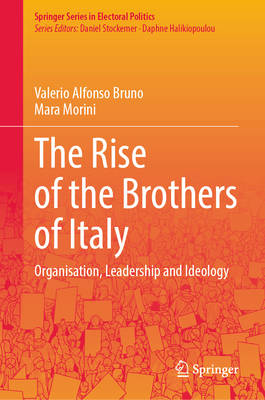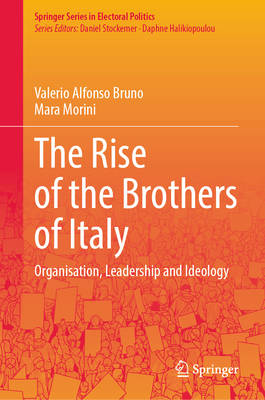
- Afhalen na 1 uur in een winkel met voorraad
- Gratis thuislevering in België vanaf € 30
- Ruim aanbod met 7 miljoen producten
- Afhalen na 1 uur in een winkel met voorraad
- Gratis thuislevering in België vanaf € 30
- Ruim aanbod met 7 miljoen producten
Zoeken
The Rise of the Brothers of Italy
Organisation, Leadership and Ideology
Valerio Alfonso Bruno, Mara Morini
€ 126,95
+ 253 punten
Omschrijving
This book offers a comprehensive account of the Italian party Fratelli d'Italia (Brothers of Italy), covering the period from its foundation in December 2012 to the summer of 2025, marking almost three years of the Meloni government. It examines the factors that have contributed to the rise of Brothers of Italy and its leader, Giorgia Meloni, establishing the party as the cornerstone of Italy's right-wing coalition and of the current government. The authors, Valerio Alfonso Bruno and Mara Morini, place the key dimensions of Meloni's party at the centre of their analysis, including its ideology, leadership, policy agenda, and electoral base. They also explore the party's relations with the other members of the right-wing coalition--Salvini's Lega and Berlusconi's Forza Italia--as well as with far-right movements in Italy and abroad. The first part of the book analyses the party's first decade (2012-2022), tracing its trajectory from the breakaway from Berlusconi's Popolo della Libertà, amid the sovereign debt crisis and the technocratic government led by Mario Monti, to its victory in the 2022 general election. The second part focuses on the organization, structure, ideology, and leadership of the party, concluding with an in-depth examination of its policies. This book will appeal to students, scholars, and researchers of political science in general, and electoral studies in particular, seeking a deeper understanding of the Brothers of Italy party and contemporary Italian electoral politics.
Specificaties
Betrokkenen
- Auteur(s):
- Uitgeverij:
Inhoud
- Aantal bladzijden:
- 188
- Taal:
- Engels
- Reeks:
Eigenschappen
- Productcode (EAN):
- 9783032134370
- Verschijningsdatum:
- 3/01/2026
- Uitvoering:
- Hardcover
- Formaat:
- Genaaid
- Afmetingen:
- 156 mm x 234 mm
- Gewicht:
- 467 g

Alleen bij Standaard Boekhandel
+ 253 punten op je klantenkaart van Standaard Boekhandel
Beoordelingen
We publiceren alleen reviews die voldoen aan de voorwaarden voor reviews. Bekijk onze voorwaarden voor reviews.







